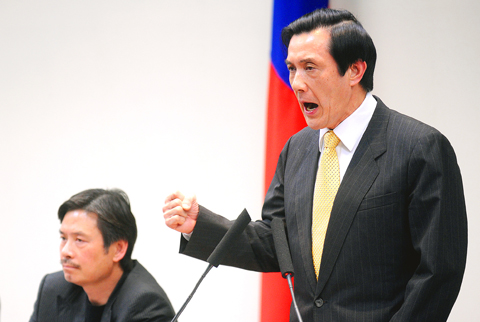President Ma Ying-jeou (馬英九) yesterday lauded Chinese Nationalist Party (KMT) legislators' efforts to pass the amendment to the Local Government Act (地方制度法) on Monday, vowing to assert the party's dominance in the legislature.
The KMT-dominated legislature pushed through the disputed amendment during a hastily arranged extra legislative session on Monday amid fistfights, yelling, shouting and pushing.
Ma, who doubles as KMT chairman, said his party did not let the public down because it helped push through the legal revision in spite of opposition from the Democratic Progressive Party (DPP).

PHOTO: CHIEN JUNG-FONG, TAIPEI TIMES
“It is not in the interest of one party, but the whole nation and the people,” he said.
“It will benefit not only the two parties, but also the public,” Ma said while chairing the party's weekly Central Standing Committee.
Ma criticized the DPP, saying it had really earned its name as an “opposition” party as it had opposed the bill simply for the sake of opposition.
“It's not a good phenomenon in a democracy,” he said.
“We respected the opinions of the minority parties, but they still boycotted the bill for no reason. I fully support the action taken by the KMT legislative caucus and hope to push through more bills using the same method,” the president said.
Ma said many were disappointed with the KMT because it could not pursue its agenda despite its legislative majority.
“It is not my problem alone, but that of the whole party,” he said. “As the chairman, I must change the situation. We are not the ruling party if we cannot make such changes.”
Ma's remark drew a round of applause from committee members.
KMT caucus whip Lin Yi-shih (林益世), who spoke before Ma during the meeting, threw down the gauntlet, saying the KMT legislative caucus would not seek war, but neither would it shy away if compromises fail to guarantee smooth passage of legislation.
Nonetheless, he urged the executive branch to strengthen its communications with the legislative branch.

A strong continental cold air mass is to bring pollutants to Taiwan from tomorrow, the Ministry of Environment said today, as it issued an “orange” air quality alert for most of the country. All of Taiwan except for Hualien and Taitung counties is to be under an “orange” air quality alert tomorrow, indicating air quality that is unhealthy for sensitive groups. In China, areas from Shandong to Shanghai have been enveloped in haze since Saturday, the ministry said in a news release. Yesterday, hourly concentrations of PM2.5 in these areas ranged from 65 to 160 micrograms per cubic meter (mg/m³), and pollutants were

Taiwan’s armed forces have established response protocols for a wide range of sudden contingencies, including the “Wan Chun Plan” to protect the head of state, the Ministry of Defense (MND) said today. After US President Donald Trump on Saturday launched a series of airstrikes in Venezuela and kidnapped Venezuelan President Nicolas Maduro, concerns have been raised as to whether China would launch a similar “decapitation strike” on Taiwan. The armed forces regularly coordinate with relevant agencies and practice drills to ensure preparedness for a wide range of scenarios, Vice Minister of National Defense Hsu Szu-chien (徐斯儉) told reporters before a

EVA Airways on Saturday said that it had suspended a pilot and opened an investigation after he allegedly lost his temper and punched the first officer several times as their plane was taxiing before takeoff at Los Angeles International Airport. According to a report published on Thursday by The Reporter, the incident occurred after the flight’s Malaysian first officer tried to warn the Taiwanese pilot, surnamed Wen (文), that he was taxiing faster than the speed limit of 30 knots (55.6kph). After alerting the pilot several times without response, the first officer manually applied the brakes in accordance with standard operating

Japanese Councilor Hei Seki (石平) on Wednesday said that he plans to visit Taiwan, saying that would “prove that Taiwan is an independent country and does not belong to China.” Seki, a member of the Japan Innovation Party, was born in Chengdu in China’s Sichuan Province and became a naturalized Japanese in 2007. He was elected to the House of Concilors last year. His views on the Chinese Communist Party (CCP) — espoused in a series of books on politics and history — prompted Beijing to sanction him, including barring Seki from traveling to China. Seki wrote on X that he intends